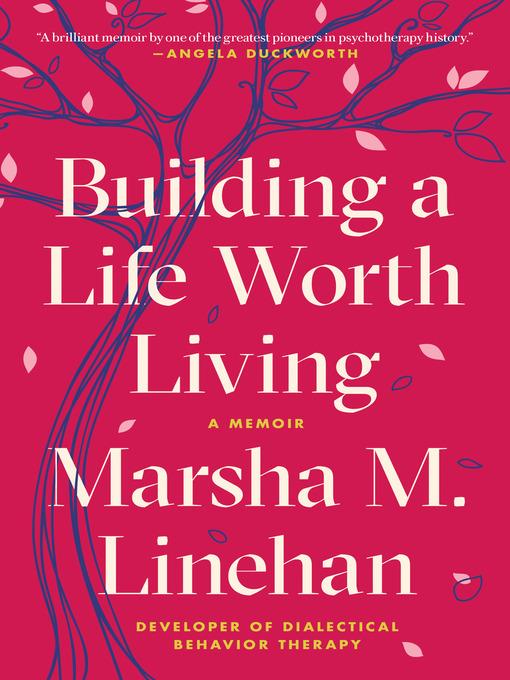
Building a Life Worth Living
A Memoir
کتاب های مرتبط
- اطلاعات
- نقد و بررسی
- دیدگاه کاربران
نقد و بررسی

June 24, 2019
In this powerful and intimate memoir, psychologist Linehan shares the history of her own mental illness as well as the development of her treatment for suicidal individuals, called Dialectical Behavior Therapy (DBT). Her memoir follows her “descent into hell” with mental illness, her spiritual evolution (raised a Catholic, she becomes a self-described Zen master), and her work as a research professor. She writes of her youth in Tulsa, Okla., as one of six children born to an oil executive and his wife, who was active in their community. At 18, Linehan entered a deep depression and became suicidal; her parents committed her to a mental institution, where she engaged in self-burning and self-cutting, was heavily medicated, placed in seclusion for 12 weeks, and received shock therapy. Linehan made a vow to help others like herself, and after two years she was released and became a psychologist, ultimately developing DBT by combining practical life skills, Zen teachings, and behavior therapy. Linehan ably guides readers along her roller-coaster life as she conquers the male-dominated world of academia while hiding her physical and emotional scars. In spite of challenges, the author was determined and optimistic: “You can’t think yourself into new ways of acting; you can only act yourself into new ways of thinking.” Readers looking to overcome their past will find inspiration in this dramatic, heartfelt narrative.

December 1, 2019
The psychologist who developed dialectical behavior therapy to treat suicidal individuals reflects on her own life in this gripping memoir. Linehan (DBT Skills Training Handouts and Worksheets, 2014, etc.) grew up in a "reasonably well-off" family in Tulsa, Oklahoma, in the 1940s and '50s. A "happy-go-lucky, confident high school girl," though not a good fit for her more sedate family, she experienced a breakdown during her senior year of high school and was institutionalized for more than two years at the Institute for Living in Hartford, Connecticut. The psychoactive drugs and electroconvulsive therapy she was given, in addition to long periods of solitary confinement, left her with few memories of her childhood and adolescence, which she reconstructs here with the help of others. Linehan went on to study psychology and, later, train as a Zen master and work as a research scientist at the University of Washington. These Western and Eastern strands combined to influence the therapeutic protocol she developed, which has been clinically proven to benefit those affected by borderline personality disorder and suicidal tendencies. DBT, one of the first psychological treatment plans to incorporate the teaching of mindfulness, combines a recognition and deep acceptance of what the patient is feeling with the implementation of a behavioral plan for change. While the technique may not strike readers as revolutionary as Linehan contends it is, the author obviously has deep empathy for those she treats and a willingness to try a range of techniques to help them. Although she has chosen not to write about any of her clients, for the sake of their privacy, her description of her own slow, uneven recovery from what she calls a version of hell is compelling, and it's easy to see how it would translate to other individuals. While she doesn't stress the point, it's also clear that both the spiritual and practical approaches she takes would also benefit those with less extreme psychological challenges. An inspiring account of healing and helping.
COPYRIGHT(2019) Kirkus Reviews, ALL RIGHTS RESERVED.

Starred review from January 1, 2020
Many readers will identify with the journey at the heart of this moving memoir from renowned psychologist Linehan (psychiatry & behavioral sciences, Univ. of Washington; Cognitive-Behavioral Treatment of Borderline Personality Disorder). Diagnosed with schizophrenia in her late teens but believing her condition to be closer to borderline personality disorder, Linehan devoted her life to researching this complicated illness. Here, the author describes the electroconvulsive therapy treatments she received in the 1960s, and how she promised God that once cured, she would do all she could to help others coping with mental illness. Her development of dialectical behavior therapy (DBT) in the 1980s, which centers on principles of self-acceptance and changing one's patterns of behavior, led to a groundbreaking program for people experiencing suicidal ideation. Readers will admire how Linehan persevered and rose to the top of her field in the aftermath of trauma. VERDICT Survivors of all kinds and seekers of professional and spiritual growth will appreciate Linehan's inquisitive nature and her path to recovery and understanding. Her groundbreaking work should be read by anyone considering a career in psychology and related fields.--Chad Clark, San Jacinto Coll. Dist., Pasadena, TX
Copyright 2020 Library Journal, LLC Used with permission.

November 1, 2019
Bringing together science and the divine, psychologist and creator of dialectical behavior therapy (DBT) Linehan tells her story in this practical and engaging memoir. She turned from a cheerful teen who was nominated as class Mardi Gras queen to experiencing such a mental break that she was admitted to a secure institution and placed in a unit for the most disturbed patients. While Linehan admits never knowing what happened to cause that change, she dates her life's mission to that time, when she vowed to get herself out of hell and promised to do the same for others. She more than succeeded by creating DBT, the first treatment proven effective for those diagnosed with borderline personality disorder. Linehan leads readers through her life and details how key moments brought her to develop DBT, bringing mindfulness into psychotherapy. Weaving the instructive with the personal, she alternates anecdotes with universal tools for approaching life with a combination of acceptance and motivation to change.(Reprinted with permission of Booklist, copyright 2019, American Library Association.)

























دیدگاه کاربران